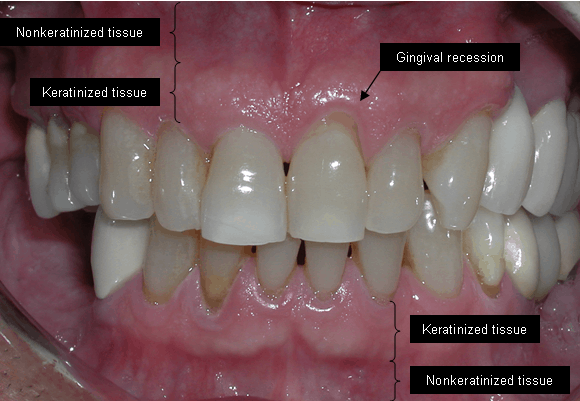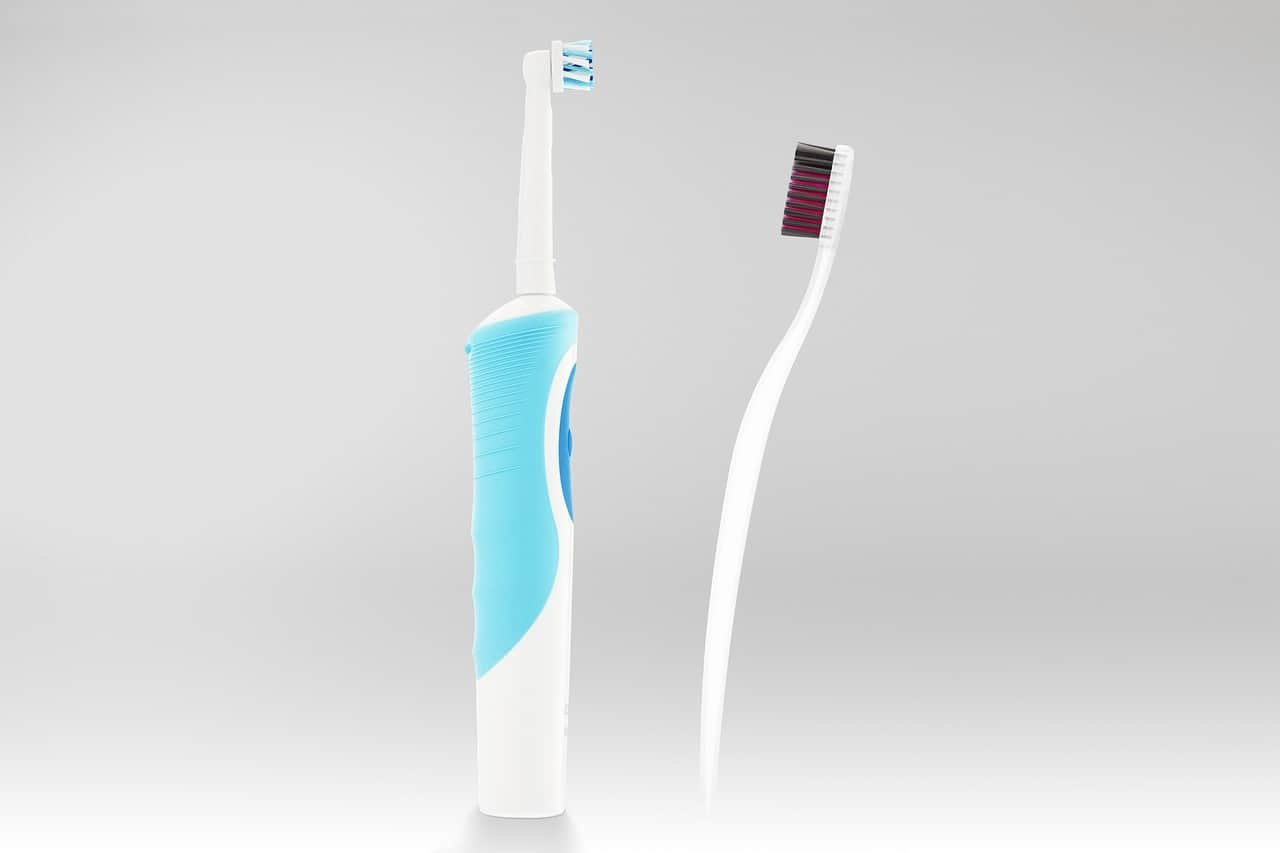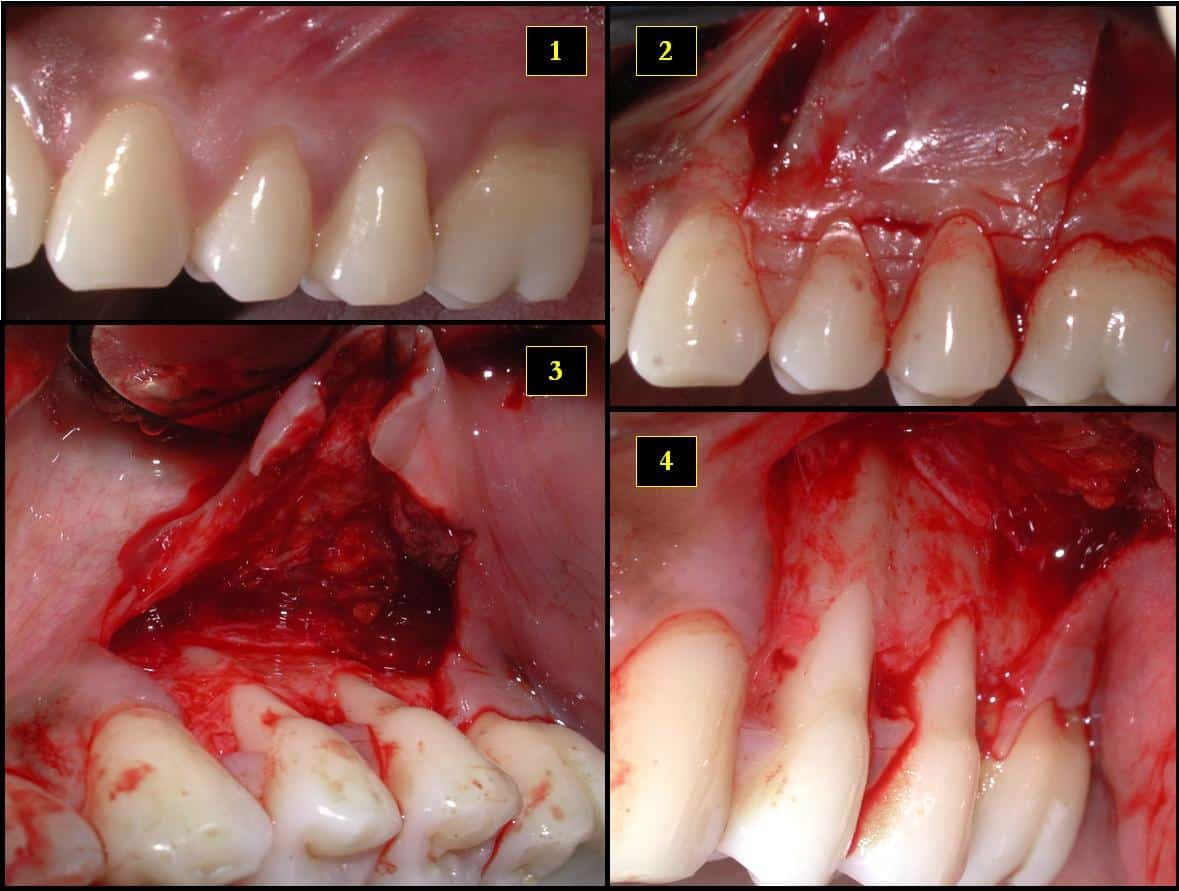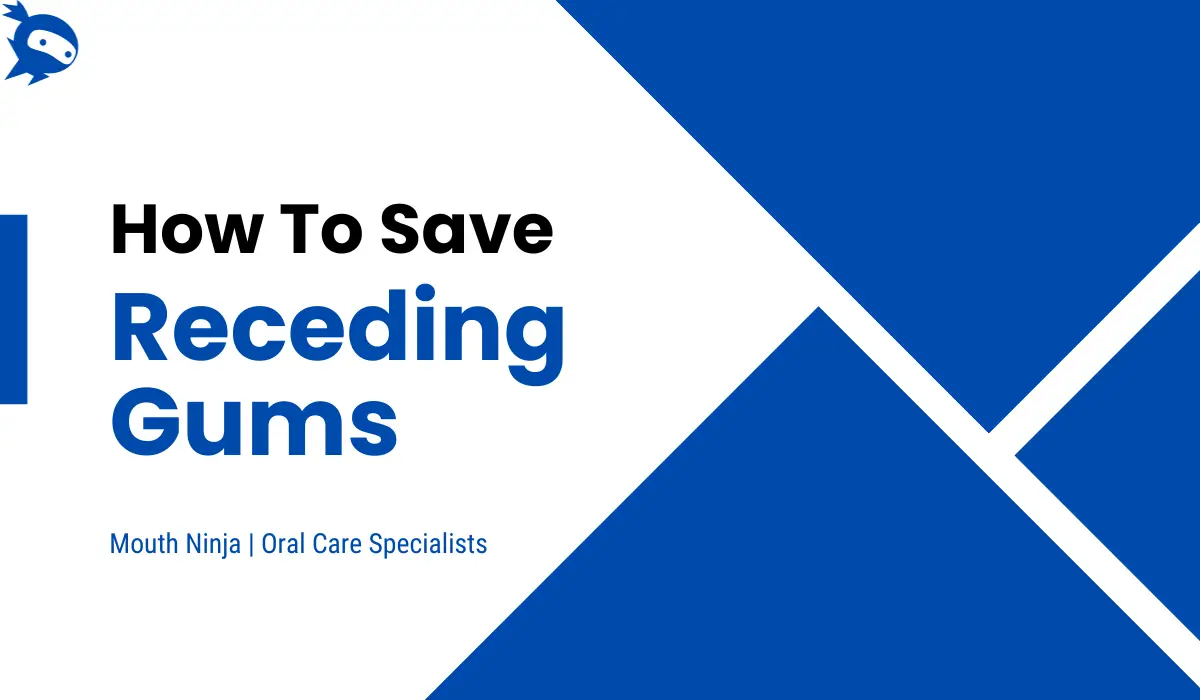Receding gums occur when the gum tissue surrounding the teeth pulls back, exposing more of the tooth or even the tooth’s root.
Gum recession is a common dental problem that affects many people. It can be caused by a variety of factors, including gum disease, brushing too hard, and genetics.
If left untreated, gum recession can lead to tooth decay, loss of teeth, and other health problems.
Fortunately, there are several things that can be done to save receding gums. Maintaining good oral hygiene is one of the most important things you can do to prevent gum recession.
Brushing your teeth twice a day with a soft-bristled toothbrush and flossing daily can help remove plaque and prevent the buildup of harmful bacteria that can lead to gum disease.
Additionally, using an antimicrobial mouthwash can help kill bacteria and prevent gum disease.
Understanding Gum Recession
Gum recession is a common dental problem that occurs when the gum tissue pulls away from the teeth, exposing the roots of the teeth.
It is often caused by poor oral hygiene practices, but other factors such as genetics, hormonal changes, and certain medical conditions can also contribute to gum recession.

Some of the common causes of gum recession include:
- Aggressive brushing: Brushing your teeth too hard or using a toothbrush with hard bristles can cause the gum tissue to wear away over time.
- Gum disease: Gum disease is a bacterial infection that can damage the gum tissue and cause it to recede.
- Hormonal changes: Changes in hormone levels during pregnancy, puberty, and menopause can make the gums more sensitive and prone to recession.
- Smoking: Smoking can damage the gum tissue and reduce blood flow to the gums, making them more susceptible to recession.
- Genetics: Some people are more prone to gum recession due to genetic factors.
If left untreated, gum recession can lead to tooth sensitivity, decay, and even tooth loss.
However, there are several treatment options available to help prevent further recession and restore the gum tissue.
Some of the common treatments for gum recession include:
- Scaling and root planing: This is a deep cleaning procedure that removes plaque and tartar from below the gumline and smooths out the roots of the teeth.
- Gum graft surgery: This involves taking gum tissue from another part of the mouth and attaching it to the area of recession to cover the exposed root.
- Antibiotics: In some cases, antibiotics may be prescribed to treat any underlying bacterial infection that is contributing to gum recession.
- Good oral hygiene practices: Brushing twice a day, flossing daily, and using an antimicrobial mouthwash can help prevent further gum recession and improve overall oral health.
It is important to seek treatment for gum recession as soon as possible to prevent further damage to the teeth and gums.
Regular dental check-ups and cleanings can also help detect and prevent gum recession before it becomes a more serious problem.
Causes of Receding Gums
Receding gums occur when the gum tissue surrounding the teeth wears away or pulls back, exposing the root of the tooth.
This can lead to tooth sensitivity, decay, and even tooth loss.
There are several factors that can contribute to receding gums, including:
Poor Oral Hygiene
Poor oral hygiene is one of the leading causes of receding gums.
When plaque and tartar buildup on the teeth, they can cause gum inflammation, which can eventually lead to gum recession.
Brushing and flossing regularly can help remove plaque and prevent gum disease.
Periodontal Diseases
Periodontal diseases, such as gingivitis and periodontitis, can also cause receding gums.
These diseases are caused by bacterial infections that attack the gums and bone supporting the teeth.
If left untreated, they can cause the gums to recede and the teeth to become loose or fall out.
Aggressive Brushing
Brushing your teeth too hard or using a toothbrush with hard bristles can also cause the gums to recede.
This is because aggressive brushing can wear away the gum tissue and cause it to pull back from the teeth.
It is important to use a soft-bristled toothbrush and brush gently to avoid damaging the gums.

Genetic Factors
Some people are more prone to receding gums due to genetic factors.
If your family has a history of gum disease or receding gums, you may be more likely to develop these conditions as well.
It is important to maintain good oral hygiene and visit the dentist regularly to prevent or treat receding gums.
By understanding the causes of receding gums, you can take steps to prevent or treat this condition.
Maintaining good oral hygiene, treating periodontal diseases, using a soft-bristled toothbrush, and visiting the dentist regularly can all help prevent or treat receding gums.
Symptoms of Receding Gums
Receding gums can be a serious dental problem that should not be ignored. It is important to recognize the signs and symptoms of gum recession so that you can seek treatment early.
Here are some common symptoms of receding gums:
- Sensitive Teeth: If you experience pain or discomfort when consuming hot, cold, sweet, or acidic foods and drinks, it could be a sign of gum recession. When gums recede, the sensitive parts of your teeth become exposed, which can cause discomfort.
- Longer Teeth: If you notice that your teeth appear longer than usual, it could be a sign of gum recession. As the gums pull away from the teeth, more of the tooth becomes exposed, making it appear longer.
- Notched or Pocketed Gum Line: If you notice a notch or pocket forming where the gum meets the tooth, it could be a sign of gum recession. This is caused by the gums pulling away from the tooth, leaving a gap.
- Bleeding Gums: If your gums bleed when you brush or floss your teeth, it could be a sign of gum disease, which can lead to gum recession.
- Bad Breath: If you have persistent bad breath, it could be a sign of gum disease, which can cause gum recession.
If you experience any of these symptoms, it is important to see a dentist or periodontist as soon as possible.
Early treatment can help prevent further damage to your gums and teeth.
Preventing Gum Recession
Gum recession can be prevented by following some simple steps.
Here are some ways to prevent gum recession:
Regular Dental Checkups
Regular dental checkups are important to prevent gum recession. A dentist can detect gum recession early and provide treatment to prevent further damage.
A dental hygienist can also clean the teeth and gums to remove plaque and tartar buildup.
Proper Brushing Techniques
Proper brushing techniques can prevent gum recession. Brushing twice a day with a soft-bristled toothbrush and fluoride toothpaste can help remove plaque and prevent gum disease.
It is important to brush gently and not apply too much pressure to the teeth and gums. Flossing daily can also help remove plaque and prevent gum disease.
Healthy Diet
A healthy diet can also prevent gum recession. Eating a balanced diet that is rich in vitamins and minerals can help keep the teeth and gums healthy.
Foods that are high in sugar and carbohydrates can increase the risk of gum disease and tooth decay.
Drinking plenty of water can also help flush away food particles and bacteria that can cause gum disease.
In summary, preventing gum recession requires regular dental checkups, proper brushing techniques, and a healthy diet.
By following these simple steps, you can help keep your teeth and gums healthy and prevent gum recession.
Treatment Options for Receding Gums
There are several treatment options available for receding gums, ranging from non-invasive to surgical procedures. The most appropriate treatment will depend on the severity of the condition and the underlying cause.
Deep Cleaning
Deep cleaning, also known as scaling and root planing, is a non-surgical treatment option for receding gums.
This procedure involves removing plaque and tartar buildup from the teeth and gums, and smoothing out the roots of the teeth to prevent further bacteria buildup.
Deep cleaning can help prevent further gum recession and improve overall gum health.
Gum Graft Surgery
In severe cases of gum recession, gum graft surgery may be necessary.
This procedure involves taking gum tissue from another area of the mouth, or using donor tissue, and grafting it onto the affected area to cover the exposed tooth roots.
This can help prevent further gum recession and improve the appearance of the gums.

Regenerative Procedures
Regenerative procedures, such as guided tissue regeneration and enamel matrix derivative therapy, can help stimulate the growth of new gum tissue and bone.
These procedures involve placing a barrier membrane over the affected area to encourage the growth of new tissue and bone.
Regenerative procedures can be effective in treating moderate to severe cases of gum recession.
It is important to note that the success of these treatments will depend on the underlying cause of the gum recession and the individual’s overall oral health.
It is important to consult with a dental professional to determine the most appropriate treatment plan for each individual case.
Post-Treatment Care and Maintenance
After undergoing treatment for receding gums, it’s important to take proper care of your oral health to prevent further damage.
Here are some post-treatment care and maintenance tips:
Brushing and Flossing
Brushing and flossing regularly is crucial to maintaining healthy gums.
Use a soft-bristled toothbrush and fluoride toothpaste to brush twice a day for two minutes each time.
Make sure to brush gently, using circular motions and not applying too much pressure.
Floss at least once a day to remove plaque and food particles from between your teeth and gums.
Mouthwash
Using an antimicrobial mouthwash can help kill bacteria and prevent infection. Rinse your mouth with mouthwash for 30 seconds after brushing and flossing.
Diet
Eating a balanced diet can help improve your oral health. Avoid sugary and acidic foods and drinks, which can erode tooth enamel and damage your gums.
Instead, opt for foods that are rich in vitamins and minerals, such as fruits, vegetables, and lean proteins.
Quit Smoking
Smoking can cause gum disease and slow down the healing process. Quitting smoking can improve your overall oral health and reduce your risk of developing gum disease.
Regular Dental Visits
Visit your dentist regularly for checkups and cleanings. Your dentist can monitor your oral health and catch any potential issues early on.
They can also provide additional treatments, such as scaling and root planing, if necessary.
By following these post-treatment care and maintenance tips, you can help prevent further damage to your gums and maintain a healthy smile.
Can You Fix Receding Gums Without Surgery?
The most well-known non-surgical procedure is The Keyes Method.
It was created by Dr Paul H Keyes who was one of the masters of early dentistry. With over 200 published journal papers, Dr. Keyes was one of dentistry’s most popular lecturers for over a decade both in America and 12 foreign countries. He was a heavy supporter of anti infective-therapies
Dr. Rosenthal calls it a tried-and-true method in which a deep bacterial removal procedure is involved.
A peroxide solution is used to clean the mouth, especially the pockets around the teeth and gums and then use a salt solution to remove the bacteria.
Both these actions eliminate all the bacteria in the mouth which gives the body time to heal the gums and bone. “Loads of patients have noted great results from using this method” says Dr Rosenthal.
However, there have been numerous studies, short and long term, that have shown the adjunctive use of baking soda and hydrogen peroxide have not demonstrated any particular added benefit over conventional techniques.
Are Natural Remedies Worth The Effort
Although there is no substitute for professional oral care, home remedies will definitely help with slowing down oral health problems.
You can either make your own gum disease mouth rinse using various natural solutions such as sea salt, aloe Vera gel, coconut oil.
All contain immense minerals and anti bacterial and anti inflammatory properties which are great for keeping gums healthy.
But it takes a lot of time and research to mix the right concentrations of each ingredient to make the rinse fully effective.
That is why we recommend you go for a product that already contains powerful ingredients all mixed effectively to give the best possible solution.

The best natural product we have come across that treats anything related to gums is: Dental Pro 7
It is a 100% pure liquid concentrate that is made from naturally sourced ingredients that have been turned into pure botanical grade essential oils. It focuses on fighting 3 main problems:
- Gingivitus
- Periodontal Disease
- Halitosis (bad breath)
It contains 10 ingredients all found in nature to fight gum recession as well as other things.
You basically use it the same way you would use toothpaste, just add 3–4 drops onto a toothbrush and brush for 2 minutes. Do this twice a day and within 2–4 weeks you will notice big changes.
90 Day Money Back Guarantee!!!
No other health product gives a guarantee which should give you an idea of how much they believe in the product.
You can read the full review.
Conclusion
Gum recession is not good news at all, it will lead to tooth loss if not treated in good time. Some major signs of recession include:
- Elongation of the teeth
- Tooth sensitivitiy
- Abfraction
If you start to see any of these signs you need to change your oral habits. Start brushing your teeth softly and in a circular upward motion.
But most of the time we realize our gum recession too late and it is only surgical methods which can save us.
Grafting is the most common procedure carried out by dentists but technology is getting better all the time so I have no doubt that fixing recession will be a simple and painless procedure in the near future.
There are also some natural home remedy products you can try out to see if they have any effect on your gums and I would highly suggest you do this before you even consider any professional treatments as it might just get the job done.
Hopefully this article has given you some sort of help and better understanding of why gum recession occurs, but if your still unsure of something please get in touch by commenting below and we will get back to you promptly.

